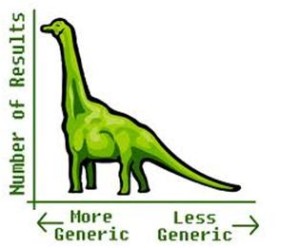The latest Google algorithm updates have rendered many of the previous search engine ranking best practices outmoded and obsolete. The reason is obvious. Google wants to give preference and priority to its visitors. Discussed hereunder are 10 tips (dos and don’ts) that would help content rank moving forwards 2013:
- Keyword density no longer holds good in Google’s pedagogy. Use of keywords is necessary, but in a natural and blended way. Keyword stuffing is only likely to penalize your website rather than do any good, because it robs the content of sense, which is something that is discouraged by Google.
- Short keywords not only make ranking on the search engine a difficult task but are a deterrent to conversions too. This is mainly because of the high competitiveness of the short keywords and the fact that everyone wants to rank on them. Contrary to this mind frame, searches are mostly done in long phrases.
- Natural content is always preferred by Google, who highly values its visitor’s time and effort and wants to ensure that their efforts are justified. Besides, it actually makes no sense if your content ranks but does not have the capacity to achieve conversions.
- Using Latent Semantic Indexing (LSI), Google and various other search engines analyze the intent of search done by visitors which enable results with higher relevancy. Therefore, use of related keywords, synonyms and variations in grammar is suggested, as this would add more meaning and relevancy to content making them more engaging and thus aiding conversions.
- Long tailing keywords have lower search volumes because they have a number of variations possible for them, making content easier to rank on search engines. This is however not possible for short keywords which have lesser variations and therefore more competition.
- A writer would know that a topic can only be skimmed through in shorter word limits. Quality and depth in content can be imbibed only when it’s longer. Google too credits higher value to in-depth and quality content. However this does not imply use of content that has been elongated just for the sake of ranking. The piece should be making sense and disseminating information.
- What is the use of good content if it does not reach out to who it is intended for? Sharing content would not only get you links and visibility but also virility that will make you or your business popular, something that Google will definitely reward you for. Therefore share your content through blogs, forums, newsletters, influencers and also through various social media platforms like Facebook, Twitter, Google+, etc
- Ranking is the eventual expectation out of all marketing efforts. Similarly, content too is aimed to help in ranking on search engines. Google+ is playing a significant role in SEO of late. With the introduction of the Author rank, authors will also be able to rank themselves besides their websites, attributing individuality or personality to every piece an author writes. All that needs to be done is creation of a Google+ profile, adding the Author Rank markup, posting pieces and building ranks thereafter. Goes without saying that a higher Author Rank would always work to your advantage as a writer, for every piece of writing you post.
- The role of the Title cannot be underestimated anyhow. It can never be. The first thing that catches the eye of a reader is the title tag. It has to be compelling enough to make the visitor read click on it. It does require effort and time to get a good title for each piece, but the effort invested will definitely pay off. The same rule applies to the snippet or the Meta description, based on which the visitor would determine if he would want to read on further or not.
- An author’s task does not end with posting the piece on the site with great content. If there are visitors who have queries related to your topic, ensure that they are answered. If they have taken the effort to read your work, it’s only courteous to reply them back with acknowledgements and suitable answers to their queries.
Few algorithms have changed while some still hold good. However, there is one thing that needs to be kept in mind; Quality Rules. If there is quality in your work you will definitely be preferred.So are you following the latest Google algorithms and updates for content? What challenges are you facing therein? Share your thoughts with us.










